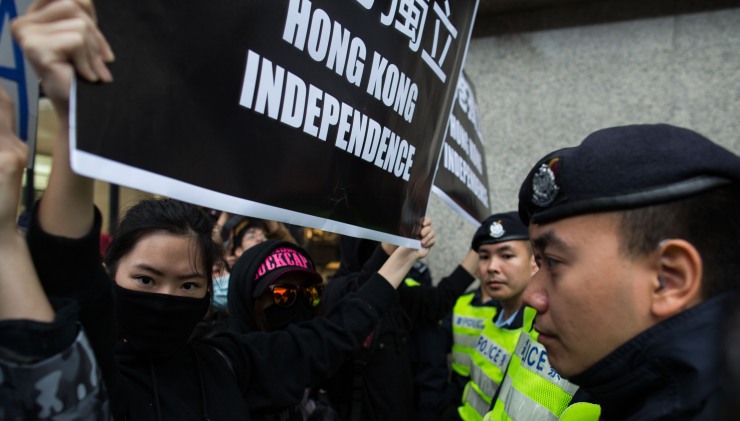Although Hong Kong’s fear-mongers—out in their legions once again following the recent formation of the city’s first openly pro-independence party—usually don’t come right out and say it, the shadow of the June 4, 1989 crackdown looms over their warnings about the city’s uncertain future.
And that’s supposed to scare us all into shutting our traps and going back to the real purpose of Hong Kong—which is not politics and protest but rather business, business and more business.

Reacting to the creation of the Hong Kong National Party, Beijing’s chief representative in Hong Kong, Zhang Xiaoming, said its pro-independence platform was not protected by the guarantee of free speech in Hong Kong’s mini-constitution, the Basic Law.
Chief Secretary Carrie Lam Cheng Yuet-ngor and Secretary for Justice Rimsky Yuen Kwok-keung were quick to agree that even talking about an independent Hong Kong was unacceptable. Executive Councillor Bernard Chan worried publicly about the “unnecessary anxiety” such talk causes our masters to the north.
Finally, Kaizer Lau Ping-cheung, deputy director of Chief Executive Leung Chun-ying’s 2012 election campaign, likened advocating independence to planning the robbery of a bank.

In the end, all this overstretched official and semi-official rhetoric amounts to a request to the people of Hong Kong to accept an unacceptable paradox—that we may well lose the freedoms we so dearly treasure by exercising them to the fullest.
Moreover—and, again, our officials and their representatives don’t say it outright—if we minions complain too much or too loudly, we might stir the angry Beast of Beijing. Once stirred, the monster might fully awaken, as it did in Tiananmen Square nearly 27 years ago, and fix its unforgiving gaze on our unruly city.
After that . . . we are left to imagine the ghastly consequences that could ensue.
But the frightening fable doesn’t fit, and we all know it.
The Beast of 1989 has lost its fangs. Now that China has transformed into a nation that boasts the second-largest economy in the world, it also desperately aspires to a diplomatic status in global affairs that is equal to its economic position.
Nations seeking first-tier recognition on the international stage do not unleash soldiers and tanks on their citizenry—whether, in China’s case, that be on the mainland or in special administrative regions such as Hong Kong.
As long as the people of this city keep their heads and refrain from violence, they are safe from the PLA and from a local police department whose politicisation has clearly accelerated since Leung became chief executive four years ago.
Indeed, we should all be safe under the protections of the Basic Law to say and do whatever we like as long as it does not bring harm to ourselves or others.

Talk of independence may be impractical, but it is not illegal in Hong Kong. At this point anyway, no court in the city would sanction the prosecution of someone for simply talking about or even advocating independence.
What is causing “anxiety” in Beijing and among loyalists here is that such talk might catch on and turn into a substantial movement that gathers force. But that’s not going to happen—at least not in the near future—and telling Hong Kong people to shut up has never worked anyway. They just keep talking, as is their right.
Sadly, the Hong Kong example serves as a reminder to the world of China’s continuing and profound insecurity as a nation. No country confident in its own system would worry so much about a relative handful of “separatists” in tiny Hong Kong. And no Hong Kong government that had not completely caved in to the warped psychology of the Chinese leadership would choose to reflect that paranoia.
Actually, given the huge cultural and political divide that separates Hong Kong from the mainland, it can be said that the city is adapting fairly well to what has been a very awkward, loveless arranged marriage now well into its 19th year.

Yes, some brick-throwing crazies turned Mong Kok into a battle zone over the Lunar New Year, localist sentiment is on the rise and now there is even an (unregistered) pro-independence party.
Most people, however, go about their business and quietly accept—albeit many doing so reluctantly—their unlovable Chinese sovereign.
That is a far more remarkable story than the bricks that were thrown in Mong Kok in February and the calls for independence today.
Let’s remember, China is a nation that is afraid of Facebook, YouTube and Gmail and so employs an army of Internet censors to block them. Even smutty Hong Kong booksellers are to be feared and silenced.
China is a nation that regards the Dalai Lama, winner of a Nobel Peace Prize, as a violent separatist.
China is a nation that sees charitable NGOs as a subversive threat to Communist Party rule.
And China is a nation that jails journalists, activists and anyone else who stands up for freedom of expression and human rights on the mainland.
If these abhorrent attributes are the bitter pill Hong Kong must swallow to retain its special status under Chinese rule, then so be it.
But let’s check and rigorously quarantine those attributes at the border and keep Hong Kong free.
Otherwise, who can blame those who dream aloud of independence?
